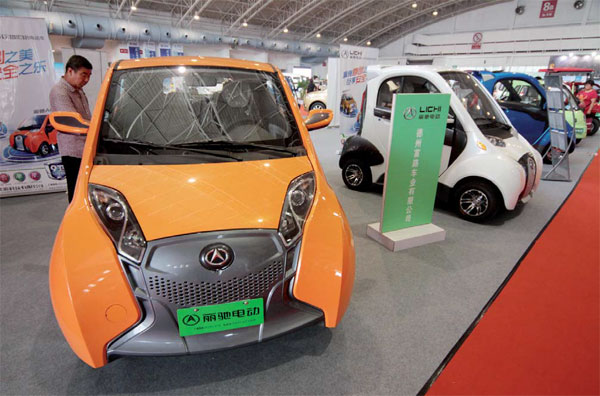Tax break for new-energy vehicles
Hybrid, fuel cell and EVs get exemption
When the State Council recently announced new-energy vehicles are exempt from purchase taxes from Sept 1 to the end of 2017, it was another boost to the industry as automakers, various levels of government and power suppliers gear up to do their part.
Tax-exempt vehicles include all-electric cars, plug-in hybrids and fuel cell vehicles.
|
New energy car at the Beijing auto show this year. Various levels of government, carmakers and electricity suppliers need to work together to develop the market, said a leading expert. Wu Changqing / For China Daily |
With the usual purchase tax of 10 percent gone, "it will greatly enhance the appeal of new-energy vehicles", a salesman at a Shanghai Roewe dealership told Shanghai Securities News.
An online poll at sohu.com shows nearly 60 percent of 2,588 respondents said they will buy new energy vehicles as they become cheaper when the policy goes into effect later this year.
Electric-car buyers are already receiving subsidies from the central government and many local governments.
Those who purchase plug-in hybrids will probably receive the same subsidies from the end of this year, said Ouyang Minggao, a professor at Tsinghua University and head of the nation's energy-saving and new-energy vehicle program.
Ouyang said he is optimistic about the prospects as he believes government support is one of the three-most important driving forces in development of the new-energy vehicle market. The other two are sound infrastructure and good models, he said.
Statistics from the China Association of Automobile Manufacturers show that 20,692 new-energy vehicles were produced and 20,477 sold in the first half of the year, more than double the figure from the same period last year.
Ouyang said sales could hit 100,000 units in 2014 as a number of new models are set to arrive by year's end. He calls it "the start of the new-energy vehicle's era".
The lack of charging facilities is another impediment to the popularity of new energy vehicles, but Yang Zan, a property researcher at Tsinghua University, said the actual conditions are better than many thought.
Yang said there is no problem installing private charging facilities in 10 to 15 percent of Beijing's communities and challenges can be overcome in another 40 percent.
She said it requires cooperation between the auto and property industries.
Authorities are helping the two join hands, with the Beijing government expected to adopt a regulation that requires property management companies assist residents in installing charging facilities, according to The Beijing News.
The municipal government is also demanding that developers ensure at least 18 percent of parking spaces in communities are equipped to charge new energy vehicles.
State-owned electricity giant State Grid vows to provide all the support it can to residents who want to install charging facilities.
"As long as you have a parking lot, we will provide the power supply needed," said Shen Jianxin, deputy director of sales and marketing at State Grid.
These measures will be needed as private charging facilities will eventually account for some 80 percent of the entire charging network, said Wang Cheng, a senior engineer at the China Automotive Technology & Research Center.
State Grid is also accelerating its pace of building public charging stations. Shen said it had built 500 charging stations and 22,000 charging spots by the end of June.
The country's largest power supplier will place an emphasis on the cities of Beijing and Tianjin as well as Hebei and Shandong provinces and the Yangtze River Delta region from 2014 to 2020.
The goals for 2020 are more than 62,000 stations and 670,000 spots, said Shen, who added that private capital is welcome to help build the public charging network.
At the same time automakers themselves are working with property developers and department stores to build public charging facilities.
Among others, Tesla owners now can charge their cars at the SOHO Wangjing community in Beijing. Chairman of SOHO China Pan Shiyi said his company will also work together with Tesla to offer charging facilities at SOHO communities in other cities.
German automaker BMW is working with major property developer Vanke Group to facilitate the installation and use of charging facilities in the communities it builds.
lifusheng@chinadaily.com.cn



















